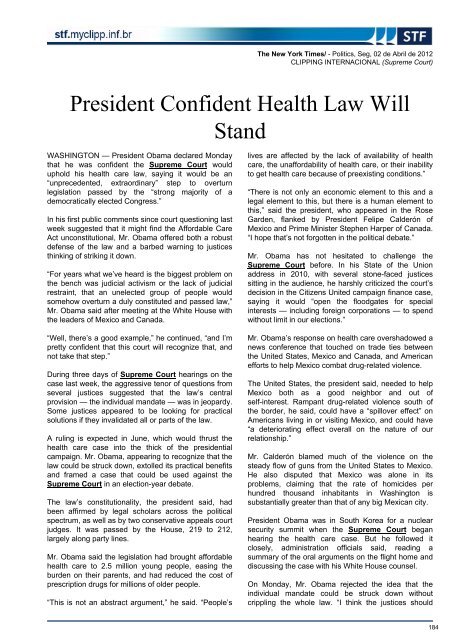STF na MÃdia - MyClipp
STF na MÃdia - MyClipp
STF na MÃdia - MyClipp
Create successful ePaper yourself
Turn your PDF publications into a flip-book with our unique Google optimized e-Paper software.
The New York Times/ - Politics, Seg, 02 de Abril de 2012<br />
CLIPPING INTERNACIONAL (Supreme Court)<br />
President Confident Health Law Will<br />
Stand<br />
WASHINGTON — President Obama declared Monday<br />
that he was confident the Supreme Court would<br />
uphold his health care law, saying it would be an<br />
“unprecedented, extraordi<strong>na</strong>ry” step to overturn<br />
legislation passed by the “strong majority of a<br />
democratically elected Congress.”<br />
In his first public comments since court questioning last<br />
week suggested that it might find the Affordable Care<br />
Act unconstitutio<strong>na</strong>l, Mr. Obama offered both a robust<br />
defense of the law and a barbed warning to justices<br />
thinking of striking it down.<br />
“For years what we’ve heard is the biggest problem on<br />
the bench was judicial activism or the lack of judicial<br />
restraint, that an unelected group of people would<br />
somehow overturn a duly constituted and passed law,”<br />
Mr. Obama said after meeting at the White House with<br />
the leaders of Mexico and Ca<strong>na</strong>da.<br />
“Well, there’s a good example,” he continued, “and I’m<br />
pretty confident that this court will recognize that, and<br />
not take that step.”<br />
During three days of Supreme Court hearings on the<br />
case last week, the aggressive tenor of questions from<br />
several justices suggested that the law’s central<br />
provision — the individual mandate — was in jeopardy.<br />
Some justices appeared to be looking for practical<br />
solutions if they invalidated all or parts of the law.<br />
A ruling is expected in June, which would thrust the<br />
health care case into the thick of the presidential<br />
campaign. Mr. Obama, appearing to recognize that the<br />
law could be struck down, extolled its practical benefits<br />
and framed a case that could be used against the<br />
Supreme Court in an election-year debate.<br />
The law’s constitutio<strong>na</strong>lity, the president said, had<br />
been affirmed by legal scholars across the political<br />
spectrum, as well as by two conservative appeals court<br />
judges. It was passed by the House, 219 to 212,<br />
largely along party lines.<br />
Mr. Obama said the legislation had brought affordable<br />
health care to 2.5 million young people, easing the<br />
burden on their parents, and had reduced the cost of<br />
prescription drugs for millions of older people.<br />
“This is not an abstract argument,” he said. “People’s<br />
lives are affected by the lack of availability of health<br />
care, the u<strong>na</strong>ffordability of health care, or their i<strong>na</strong>bility<br />
to get health care because of preexisting conditions.”<br />
“There is not only an economic element to this and a<br />
legal element to this, but there is a human element to<br />
this,” said the president, who appeared in the Rose<br />
Garden, flanked by President Felipe Calderón of<br />
Mexico and Prime Minister Stephen Harper of Ca<strong>na</strong>da.<br />
“I hope that’s not forgotten in the political debate.”<br />
Mr. Obama has not hesitated to challenge the<br />
Supreme Court before. In his State of the Union<br />
address in 2010, with several stone-faced justices<br />
sitting in the audience, he harshly criticized the court’s<br />
decision in the Citizens United campaign fi<strong>na</strong>nce case,<br />
saying it would “open the floodgates for special<br />
interests — including foreign corporations — to spend<br />
without limit in our elections.”<br />
Mr. Obama’s response on health care overshadowed a<br />
news conference that touched on trade ties between<br />
the United States, Mexico and Ca<strong>na</strong>da, and American<br />
efforts to help Mexico combat drug-related violence.<br />
The United States, the president said, needed to help<br />
Mexico both as a good neighbor and out of<br />
self-interest. Rampant drug-related violence south of<br />
the border, he said, could have a “spillover effect” on<br />
Americans living in or visiting Mexico, and could have<br />
“a deteriorating effect overall on the <strong>na</strong>ture of our<br />
relationship.”<br />
Mr. Calderón blamed much of the violence on the<br />
steady flow of guns from the United States to Mexico.<br />
He also disputed that Mexico was alone in its<br />
problems, claiming that the rate of homicides per<br />
hundred thousand inhabitants in Washington is<br />
substantially greater than that of any big Mexican city.<br />
President Obama was in South Korea for a nuclear<br />
security summit when the Supreme Court began<br />
hearing the health care case. But he followed it<br />
closely, administration officials said, reading a<br />
summary of the oral arguments on the flight home and<br />
discussing the case with his White House counsel.<br />
On Monday, Mr. Obama rejected the idea that the<br />
individual mandate could be struck down without<br />
crippling the whole law. “I think the justices should<br />
184











